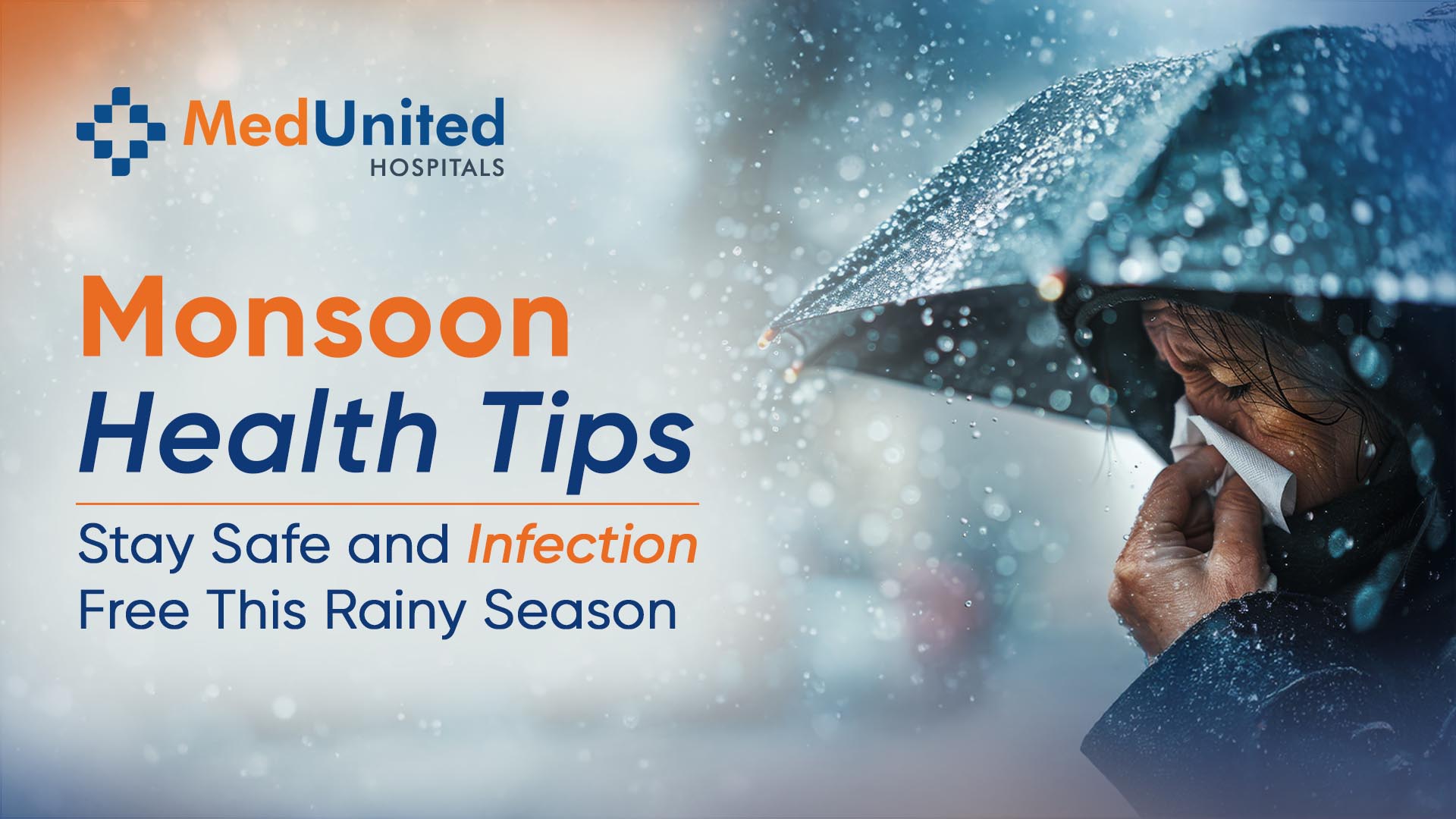
Monsoon Health Tips: Stay Safe and Infection-Free This Rainy Season
As the monsoon showers grace coastal Andhra Pradesh — including Amalapuram — we welcome a much-needed break from the summer heat. However, with the rains come a higher risk of infections due to water contamination, increased humidity, and mosquito breeding.
At Med United Hospital, the best multispeciality hospital in Amalapuram, we are committed to your health and safety. Our expert team provides comprehensive care and guidance to help you and your family stay healthy throughout the season.
Why Health Risks Rise During the Monsoon
Warm temperatures combined with high humidity create an ideal environment for the growth of bacteria, viruses, and fungi. Additionally, stagnant rainwater leads to the breeding of mosquitoes and the spread of water-borne diseases.
Common monsoon-related illnesses include:
- Dengue and malaria
- Viral fevers, colds, and flu
- Typhoid, cholera, and gastrointestinal infections
- Skin allergies and fungal infections
Monsoon Health Tips: What You Should Know
1) Maintain Personal Hygiene
Monsoon conditions increase the risk of infections through touch and contamination. Practicing good hygiene is your first line of defense.
Tips:
- Wash hands frequently, especially before eating or after exposure to rainwater.
- Keep nails trimmed and clean.
- Use alcohol-based hand sanitizers when soap and water are unavailable.
2) Drink Only Safe, Purified Water
Contaminated water is a major cause of seasonal diseases like diarrhea, jaundice, and typhoid.
Ensure your drinking water is:
- Boiled or filtered through a certified RO system
- Free from ice sourced outside
- Carried in a clean, personal water bottle when going outdoors
Unsafe drinking water can lead to infections like diarrhea, jaundice, and typhoid.
3) Eat Fresh, Hygienic, and Well-Cooked Food
Moisture accelerates bacterial growth in raw or poorly stored food.
To stay safe:
- Prefer home-cooked meals over street food
- Wash all fruits and vegetables thoroughly
- Avoid raw leafy greens from external sources
- Include immunity-boosting ingredients like garlic, turmeric, ginger, citrus fruits, and curd
Eating the right food helps your immune system stay strong against seasonal viruses.
4) Control Mosquito Breeding in and Around Your Home
Water stagnation, even in small containers, is a breeding ground for mosquitoes that spread dengue, malaria, and chikungunya.
Preventive measures:
- Remove stagnant water from coolers, pots, buckets, and old tires
- Use mosquito repellents and install nets on doors and windows
- Wear long-sleeved clothing
- Ensure proper drainage around your home
Mosquito-borne illnesses can be serious but are preventable with proper precautions.
5) Keep Your Surroundings and Skin Dry
The combination of sweat and moisture can lead to fungal skin infections like athlete’s foot or ringworm. These are common during monsoon due to excessive dampness.
Prevention
- Keep feet dry; change socks if they get wet.
- Avoid wearing damp clothes or shoes.
- Use antifungal powder in areas prone to sweating.
- Dry clothes and towels properly before use.
Consult a dermatologist at the first sign of itching, redness, or rashes to avoid spreading the infection.
6) Strengthen Your Immunity with a Balanced Diet
A strong immune system is your body’s best defense. In addition to avoiding contaminated food, ensure you are eating a well-balanced diet rich in:
- Vitamin C (oranges, amla, lemon)
- Zinc (nuts, seeds, whole grains)
- Protein (lentils, eggs, fish, dairy)
- Fluids (soups, herbal teas, water)
Regular meals with the right nutrition help reduce your risk of falling ill during seasonal transitions.
7) Seek Medical Attention Early
Do not ignore early symptoms such as fever, persistent cough, body ache, fatigue, vomiting, or diarrhea. Timely diagnosis can prevent serious complications.
At **Med United**, our team of experts includes the best general medicine doctors in Amalapuram who specialize in diagnosing and treating seasonal illnesses. Early consultation ensures faster recovery and prevents infections from worsening or spreading.


